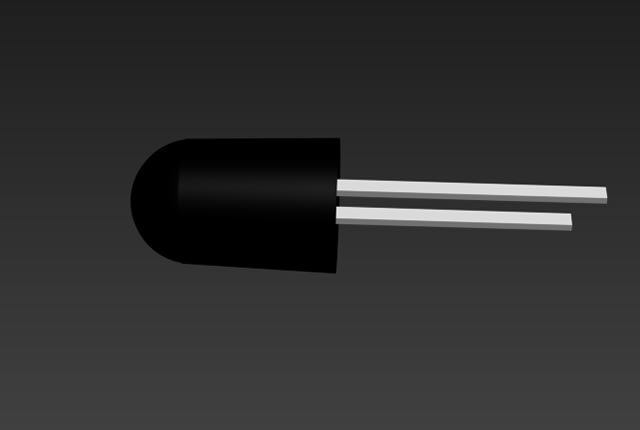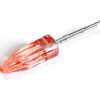Obtain 3D specification files
To examine all 3D specifications, save the files to your local drive and open them with your 3D application.
Lens colors in 3D files are solely for visual representation; consult the Datasheet for accurate lens type and color information.
In the event of a mismatch, the dimensions in the datasheet take precedence over the 3D specifications.

Understanding 5mm Phototransistors
5mm phototransistors, with their compact form factor, are distinguished by their ability to detect light and convert it into an electrical signal, functioning much like traditional transistors but with light as the primary input instead of electric current. The term «phototransistor» suggests their unique capability to sense light, and when specified as «infrared phototransistor,» it denotes their specialization in the infrared spectrum, making them indispensable in applications requiring light-based signal processing.
Key Features and Technological Advancements
The defining features of 5mm phototransistors include high sensitivity to light, fast response times, and the ability to operate efficiently under low-light conditions. These characteristics are crucial for applications requiring precise and reliable light detection. Moreover, advancements in «ir phototransistor» technology have further optimized their performance, particularly in infrared applications, enhancing their utility in a wider range of electronic devices.
Broad Spectrum of Applications
Phototransistors are integral to numerous applications across various industries. In consumer electronics, they are essential for remote controls, where they detect signals emitted by infrared LEDs. Additionally, they play a crucial role in optical sensors, ambient light sensing, and non-contact switching, demonstrating their versatility. The «5mm led data sheet» often accompanies these components, providing engineers with vital specifications to integrate them into electronic designs effectively.
Benefits for the Electronics Industry
The incorporation of 5mm phototransistors into electronic devices offers several benefits, including enhanced sensitivity to light, improved accuracy in signal detection, and the ability to operate in a wide range of environmental conditions. These advantages contribute to the development of more reliable, efficient, and cost-effective electronic products, benefiting both manufacturers and end-users.
Case Studies: Demonstrating Impact and Innovation
Real-world applications of 5mm phototransistors showcase their impact and versatility. One case study highlights their use in automotive safety systems, where they contribute to obstacle detection mechanisms, enhancing vehicle safety. Another example features their application in smart home devices, enabling sophisticated ambient light adjustment for energy savings and user comfort.
User Testimonials: Insights from the Field
Feedback from professionals in the electronics industry further validates the significance of 5mm phototransistors. An electronics design engineer praised their «unparalleled sensitivity and reliability,» which significantly improved the performance of a newly developed light sensor module. Meanwhile, a procurement specialist highlighted the «cost-efficiency and ease of sourcing» of these components, underscoring their value in reducing production costs while maintaining high-quality standards.
Conclusion: A Bright Future for 5mm Phototransistors
The exploration of 5mm phototransistors reveals their indispensable role in the evolution of electronic devices. As technology continues to advance, the demand for components that can offer precise light detection, efficient signal conversion, and seamless integration into complex systems will undoubtedly increase. For industry professionals, understanding and leveraging the capabilities of phototransistors is not just advantageous—it’s essential for innovation. As we look to the future, the potential applications and advancements in phototransistor technology are as limitless as the light they detect.

Features of 5mm Phototransistors:
- High reliability for consistent and dependable performance.
- Peak wavelengths available at 940nm, 880nm, and 850nm.
- Options for water-clear, yellow transparent, and blue transparent variations.
- IC compatible with low current capability for efficient operation.
- RoHs compliance
Applications of 5mm Phototransistors:
- Remote control systems.
- Light-sensitive switches.
- Object detection in industrial applications.
- Ambient light sensing for electronic devices.
- Proximity sensors.
- Optical encoders.
- Security systems.
- Industrial automation.






